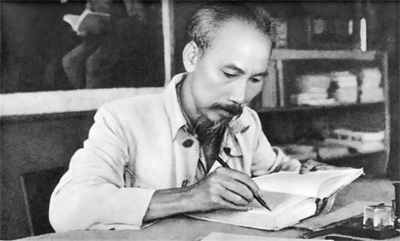Even now, there are people who are still bewildered about how to characterize Ho Chi Minh’s achievements. He is undoubtedly the greatest hero of Vietnamese national liberation, a great man of culture. But, should we consider him a thinker or a theorist?
President Ho Chi Minh left no monumental works and no general, systematized theories, but only newspaper articles, public addresses, letters, appeals, and the like. As for masterpieces, as he himself said, he never wrote a masterpiece other than his work French Colonization on Trial.
How much theory can even be found in such simple and concise articles? He internationally avoided creating theories, nor did he wish to put them down in writing. Even without being acknowledge as a renowned thinker or theorist, he had sufficient merits to be considered a great man, one of the greatest personalities to leave his indelible stamp on the 20 th century.
Some Western researchers believe that Ho Chi Minh had no ambition to become a thinker or a theorist. They called him an “organizer” or a “realist activist”, although they qualified these terms by adjectives such as “great,” “talented,” “eminent,” etc.
 |
For instance, Jean Lacouture writes that “the Vietnamese leader did not prove to be a theorist, and, in fact, paid no attention to this aspect, and even seemed to be critical of and think little of doctrinal discussions…” As for Ho Chi Minh’s writings, long essays having the nature of general theory were not found, but only a series of concrete political articles of research articles of research, summaries or reports indicating that their author showed a great interest in the world political situation. Therefore, Lacouture considers that Ho Chi Minh’s extraordinary life and achievements came not from original theories, but from his vast learning. He was only “a talented director”, “an outstanding expert.” He also characterizes Ho Chi Minh as “a structural communist”, “because he devoted all his life to “build, mould, and form movements”.
Bernard Fall recognizes that President Ho Chi Minh was “a man of deep learning, but he was never a thinker or theorist.”
Philippe Devillers furthermore affirmed that the success of Vietnamese Marxists is not brought about by their doctrine but by the efficiency of the system, they have established, that is, not thanks to the force of their thought or theory but to their organizational skills.
What is necessary to mention right now is the fact that all the above-mentioned scholars and journalists were full of goodwill, admired Uncle Ho very much, and did not mean to reduce the historical value of the Vietnamese revolution and President Ho Chi Minh in the modern world history. All of them are correct in recognizing that Uncle Ho very modest, never presumed to be a thinker or theorist, and furthermore, disliked wordy discourse. Ruth Fisher, a representative of the German Communist Party to the Comintern, made the observation when Uncle Ho was studying at the Oriental University that “by nature, he preferred action to arguments about doctrines.”
However it also bears mentioning that the above authors, influenced naturally by the Western way of thinking, tend to have a high opinion of purely philosophical thought and to make light of realist revolutionary action. They often search for theories in abstract thought or in elevated discourse and miss the theoretical gems that can be found in simple, concise and easily understandable language.
They also believe that if such great men as Ho Chi Minh are truly thinkers or theorists, they must invariably bring about “great systems” and new theoretical treatises which challenge all familiarly accepted principles. Only such men as these are considered worthy of being called “a creator of doctrine.”
In Vietnam, this opinion exercises a fair amount of influence, and therefore it is necessary to clarify this problem before delving into Ho Chi Minh and his theory.
Ho Chi Minh - A brilliant thinker
The Gioi Publishers